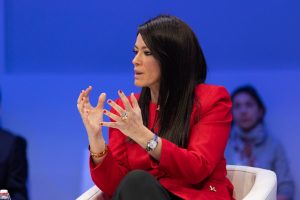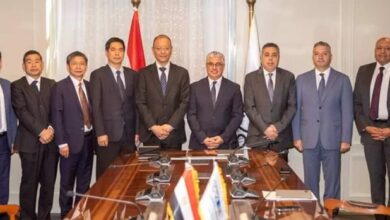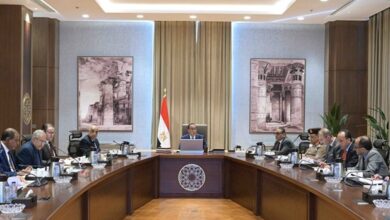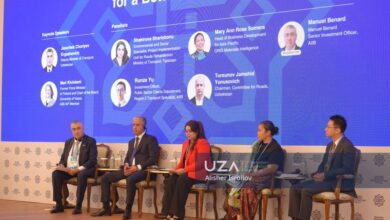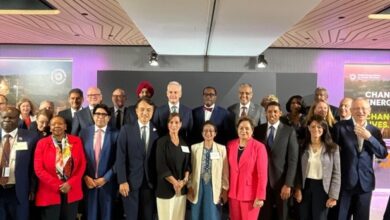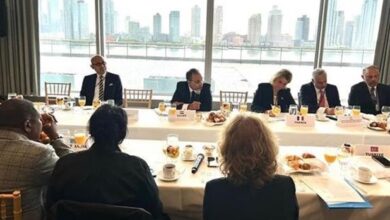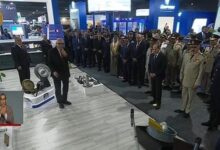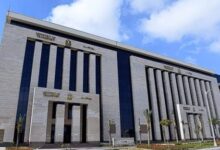Business
Minister of International Cooperation H.E. Dr.Rania A. Al-Mashat Participates in 5 Panel Discussions on Investing in Infrastructure, Clean Energy, Climate Action & Promoting Inclusion & Equality at the Davos 2023
By: Amal Ealwy
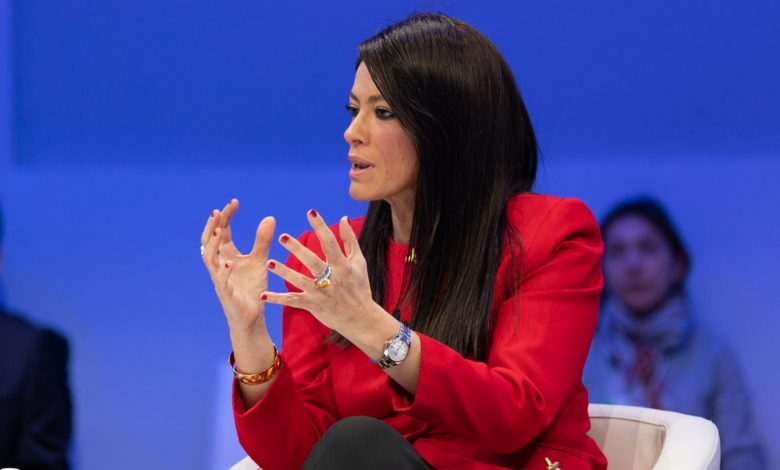
Minister of International Cooperation H.E. Dr.Rania A. Al-Mashat Participates in 5 Panel Discussions on Investing in Infrastructure, Clean Energy, Climate Action & Promoting Inclusion & Equality at the Davos 2023
● In a high-level session on “Investing in Infrastructure for Resilience”, with the participation of Ferdinand Marcos Jr, President of the Philippines and President of the EBRD, Al-Mashat reviewed Egypt’s efforts to develop flexible infrastructure to stimulate private sector investment. ● Minister of International Cooperation: “There is an urgent need to expand the availability of blended financing that stimulates the private sector for developing countries to meet their climate ambitions and shift towards clean energy.” ● Al-Mashat also participated in the Meeting of the Advisory Board of the Center for the New Economy to discuss future plans and joint efforts to promote women’s empowerment and investment in human capital.
During the 2023 World Economic Forum (WEF) Annual Meeting in Davos, the Minister of International Cooperation H.E. Dr. Rania A. Al-Mashat, participated in five-panel discussions alongside several high-level representatives of governments, development partners and the private sector, to discuss efforts to develop sustainable and resilient infrastructure, and the importance of supporting countries to withstand climate change, as well as the transition towards clean and renewable energy. H.E. also took part in the WEF’s Meeting of the Advisory Board of the Center for the New Economy.
Investing in Infrastructure for Resilience
Al-Mashat joined the high-level roundtable discussion on “Investing in Infrastructure for Resilience” which was also attended by the President of the Philippines Ferdinand Marcos Jr., the Prime Minister of Belgium H.E. Alexander De Croo, President of McKinsey & Company, President of the WEF, and President of the European Bank for Reconstruction and Development (EBRD).
During the meeting, the Minister reviewed the efforts made by the Government of Egypt since 2014 to expand sustainable infrastructure projects in various fields, such as water, transport, communications, food security, and silos for storing wheat and grains, in a way that enhances resilience, achieves sustainable development, and stimulates private sector investments.
H.E. added that investments in resilient infrastructure enhance the ability to withstand climate change and stimulate economic competitiveness, stressing that partnerships between the government and private sectors are necessary in order to build more resilient societies and economies, to stimulate measures that achieve sustainable and inclusive growth, and to prioritize investments that enhance the ability to mitigate shocks.
She stressed the importance of exchanging expertise and successful experiences through South-South cooperation and triangular cooperation to accelerate the pace of development efforts, and maintain the gains achieved, especially in the light of accelerating climate change, the impacts that hamper global development and, above all, the repercussions of the COVID-19 pandemic and the war in Europe.
Rewiring the Globe for Resilience
H.E Al-Mashat also participated in the WEF’s session on “Rewiring the Globe for Resilience”, to advance economic development plans and climate action, moderated by Børge Brende, WEF President; Bob Sternfels, Managing Partner of McKinsey & Company; Khaldoon Al Mubarak, Managing Director of Mubadala Investment Company; Robin Vince, Vice Chair of BNY Mellon Foundation; and Mariya Gabriel, European Commissioner for Innovation, Research, Culture, Education and Youth.
In her keynote address, H.E. said that investing in resilience, enhancing the ability to adapt to economic variables, and stimulating private sector participation are crucial to meeting the challenges facing development efforts, so that countries can move forward and sustain development gains.
The Ministerpointed out that not investing in resilience and the ability to adapt to climate change will cause a lot of losses and damages that hinder development efforts, which was already raised at the COP27, stressing the need for governments and different countries to stimulate private investment and put projects that include the concept of development and climate together, taking care to include the social dimension in various projects and promote social inclusion.
Moreover, the Minister elaborated that without multilateral cooperation, it would be difficult to face the common challenges the world is going through.
To watch the session: www.weforum.org/events/world-economic-forum-annual-meeting-2023/sessions/rewiring-the-globe-for-resilience
Open Forum: Energy Transition Rush
Moreover, Al-Mashat also participated in the “Open Forum: Energy Transition Rush”, which discussed the global energy crisis that has reinforced the need to shift towards renewable energy and make it affordable for all in implementation of SDG 7: Affordable and Clean Energy.
Ajay Mathur, Director General of the International Solar Alliance (ISA), Maarten Wetselaar, CEO of CEPSA Energy, Lauren Shum, Curator at Boston Hub, as well as a number of officials from the private sector and international institutions participated in the session.
In her speech, the Minister said that the consequences of the energy crisis had affected various countries of the world in many aspects, so it is necessary to accelerate the pace of the transition towards renewable energy sources, the expansion of green hydrogen generation and that this serves as a catalyst for developing countries and Africa and an area of cooperation with the continent of Europe to stimulate the green transition and climate action.
She added that for developing countries and emerging economies to scale up the energy transition, the required funding must be made available. During the COP27, financing was at the top of the issues discussed in order to strengthen the capacity of different countries to provide climate finance and enable them to implement their nationally determined contribution.
She stated that private investment is necessary in this case; the expansion of climate action and energy projects should not be a cause for more debt borne by developing countries, so private investments and the hybrid financing incentives for these investments are very important and can be achieved through close cooperation between development partners, international institutions, the private sector, philanthropic organizations and other relevant stakeholders.
H.E. referred to the initiative launched by the WEF on stimulating partnerships between philanthropic organizations and the government and private sectors to advance climate action efforts and benefit from the huge resources available to these organizations.
The Minister also touched on the position of the African continent in the midst of these global challenges and the desire to shift towards clean energy, as the continent is the lowest contributor to harmful emissions, and at the same time, does not receive sufficient funding to meet its climate ambition, despite the pledge of developed countries to provide $100 billion to developing countries, noting that one of the important axes that were raised during the climate conference is the availability of innovative financing that enables developing countries to shift towards low-carbon development, clean energy and boost private investment.
Meeting of the Advisory Board of the Center for the New Economy
Al-Mashat also participated in a meeting of the Meeting of the Advisory Board of the Center for the New Economy, in order to discuss the 2023 – 2025 action plan and strategy which aims to work towards shaping resilient, equitable and prosperous economies and societies to create equal opportunities for all, through initiatives in five key areas; economic growth and transformation, employment and wages and job creation, education, skills and learning, equality, inclusion, social justice, and global risk management. The meeting touched upon the joint work between Egypt and the WEF to promote gender equality and equal opportunities through the Closing the Gender Gap Accelerator and other cooperation proposals that enhance social protection and stimulate investment in human capital.
Investing in Nature
The Minister participated in a high-level discussion session on investing in nature conservation, promoting biodiversity and closing the estimated $700 billion global nature investment funding gap.
During the session, Al-Mashat spoke about the importance of addressing the investment financing gap in nature through partnerships between relevant parties, the need for developed countries to play their part in reducing this financing gap, and the shared but differentiated responsibility between developing and emerging countries and industrial economies in this context.
The WEF 2023 Annual Meetings in Davos, Switzerland, is being held under the theme “Cooperation in a Fragmented World”, with the participation of several heads of state, heads of government, ministers, and major private sector companies. The Minister is scheduled to hold a number of bilateral meetings between the 16th and 20th with representatives of multilateral and bilateral development partners, private sector companies, and philanthropic organizations, and will also be participating in several events and sessions in light of the strengthening economic relations between Egypt and regional and international institutions.
● In a high-level session on “Investing in Infrastructure for Resilience”, with the participation of Ferdinand Marcos Jr, President of the Philippines and President of the EBRD, Al-Mashat reviewed Egypt’s efforts to develop flexible infrastructure to stimulate private sector investment. ● Minister of International Cooperation: “There is an urgent need to expand the availability of blended financing that stimulates the private sector for developing countries to meet their climate ambitions and shift towards clean energy.” ● Al-Mashat also participated in the Meeting of the Advisory Board of the Center for the New Economy to discuss future plans and joint efforts to promote women’s empowerment and investment in human capital.
During the 2023 World Economic Forum (WEF) Annual Meeting in Davos, the Minister of International Cooperation H.E. Dr. Rania A. Al-Mashat, participated in five-panel discussions alongside several high-level representatives of governments, development partners and the private sector, to discuss efforts to develop sustainable and resilient infrastructure, and the importance of supporting countries to withstand climate change, as well as the transition towards clean and renewable energy. H.E. also took part in the WEF’s Meeting of the Advisory Board of the Center for the New Economy.
Investing in Infrastructure for Resilience
Al-Mashat joined the high-level roundtable discussion on “Investing in Infrastructure for Resilience” which was also attended by the President of the Philippines Ferdinand Marcos Jr., the Prime Minister of Belgium H.E. Alexander De Croo, President of McKinsey & Company, President of the WEF, and President of the European Bank for Reconstruction and Development (EBRD).
During the meeting, the Minister reviewed the efforts made by the Government of Egypt since 2014 to expand sustainable infrastructure projects in various fields, such as water, transport, communications, food security, and silos for storing wheat and grains, in a way that enhances resilience, achieves sustainable development, and stimulates private sector investments.
H.E. added that investments in resilient infrastructure enhance the ability to withstand climate change and stimulate economic competitiveness, stressing that partnerships between the government and private sectors are necessary in order to build more resilient societies and economies, to stimulate measures that achieve sustainable and inclusive growth, and to prioritize investments that enhance the ability to mitigate shocks.
She stressed the importance of exchanging expertise and successful experiences through South-South cooperation and triangular cooperation to accelerate the pace of development efforts, and maintain the gains achieved, especially in the light of accelerating climate change, the impacts that hamper global development and, above all, the repercussions of the COVID-19 pandemic and the war in Europe.
Rewiring the Globe for Resilience
H.E Al-Mashat also participated in the WEF’s session on “Rewiring the Globe for Resilience”, to advance economic development plans and climate action, moderated by Børge Brende, WEF President; Bob Sternfels, Managing Partner of McKinsey & Company; Khaldoon Al Mubarak, Managing Director of Mubadala Investment Company; Robin Vince, Vice Chair of BNY Mellon Foundation; and Mariya Gabriel, European Commissioner for Innovation, Research, Culture, Education and Youth.
In her keynote address, H.E. said that investing in resilience, enhancing the ability to adapt to economic variables, and stimulating private sector participation are crucial to meeting the challenges facing development efforts, so that countries can move forward and sustain development gains.
The Ministerpointed out that not investing in resilience and the ability to adapt to climate change will cause a lot of losses and damages that hinder development efforts, which was already raised at the COP27, stressing the need for governments and different countries to stimulate private investment and put projects that include the concept of development and climate together, taking care to include the social dimension in various projects and promote social inclusion.
Moreover, the Minister elaborated that without multilateral cooperation, it would be difficult to face the common challenges the world is going through.
To watch the session: www.weforum.org/events/world-economic-forum-annual-meeting-2023/sessions/rewiring-the-globe-for-resilience
Open Forum: Energy Transition Rush
Moreover, Al-Mashat also participated in the “Open Forum: Energy Transition Rush”, which discussed the global energy crisis that has reinforced the need to shift towards renewable energy and make it affordable for all in implementation of SDG 7: Affordable and Clean Energy.
Ajay Mathur, Director General of the International Solar Alliance (ISA), Maarten Wetselaar, CEO of CEPSA Energy, Lauren Shum, Curator at Boston Hub, as well as a number of officials from the private sector and international institutions participated in the session.
In her speech, the Minister said that the consequences of the energy crisis had affected various countries of the world in many aspects, so it is necessary to accelerate the pace of the transition towards renewable energy sources, the expansion of green hydrogen generation and that this serves as a catalyst for developing countries and Africa and an area of cooperation with the continent of Europe to stimulate the green transition and climate action.
She added that for developing countries and emerging economies to scale up the energy transition, the required funding must be made available. During the COP27, financing was at the top of the issues discussed in order to strengthen the capacity of different countries to provide climate finance and enable them to implement their nationally determined contribution.
She stated that private investment is necessary in this case; the expansion of climate action and energy projects should not be a cause for more debt borne by developing countries, so private investments and the hybrid financing incentives for these investments are very important and can be achieved through close cooperation between development partners, international institutions, the private sector, philanthropic organizations and other relevant stakeholders.
H.E. referred to the initiative launched by the WEF on stimulating partnerships between philanthropic organizations and the government and private sectors to advance climate action efforts and benefit from the huge resources available to these organizations.
The Minister also touched on the position of the African continent in the midst of these global challenges and the desire to shift towards clean energy, as the continent is the lowest contributor to harmful emissions, and at the same time, does not receive sufficient funding to meet its climate ambition, despite the pledge of developed countries to provide $100 billion to developing countries, noting that one of the important axes that were raised during the climate conference is the availability of innovative financing that enables developing countries to shift towards low-carbon development, clean energy and boost private investment.
Meeting of the Advisory Board of the Center for the New Economy
Al-Mashat also participated in a meeting of the Meeting of the Advisory Board of the Center for the New Economy, in order to discuss the 2023 – 2025 action plan and strategy which aims to work towards shaping resilient, equitable and prosperous economies and societies to create equal opportunities for all, through initiatives in five key areas; economic growth and transformation, employment and wages and job creation, education, skills and learning, equality, inclusion, social justice, and global risk management. The meeting touched upon the joint work between Egypt and the WEF to promote gender equality and equal opportunities through the Closing the Gender Gap Accelerator and other cooperation proposals that enhance social protection and stimulate investment in human capital.
Investing in Nature
The Minister participated in a high-level discussion session on investing in nature conservation, promoting biodiversity and closing the estimated $700 billion global nature investment funding gap.
During the session, Al-Mashat spoke about the importance of addressing the investment financing gap in nature through partnerships between relevant parties, the need for developed countries to play their part in reducing this financing gap, and the shared but differentiated responsibility between developing and emerging countries and industrial economies in this context.
The WEF 2023 Annual Meetings in Davos, Switzerland, is being held under the theme “Cooperation in a Fragmented World”, with the participation of several heads of state, heads of government, ministers, and major private sector companies. The Minister is scheduled to hold a number of bilateral meetings between the 16th and 20th with representatives of multilateral and bilateral development partners, private sector companies, and philanthropic organizations, and will also be participating in several events and sessions in light of the strengthening economic relations between Egypt and regional and international institutions.
